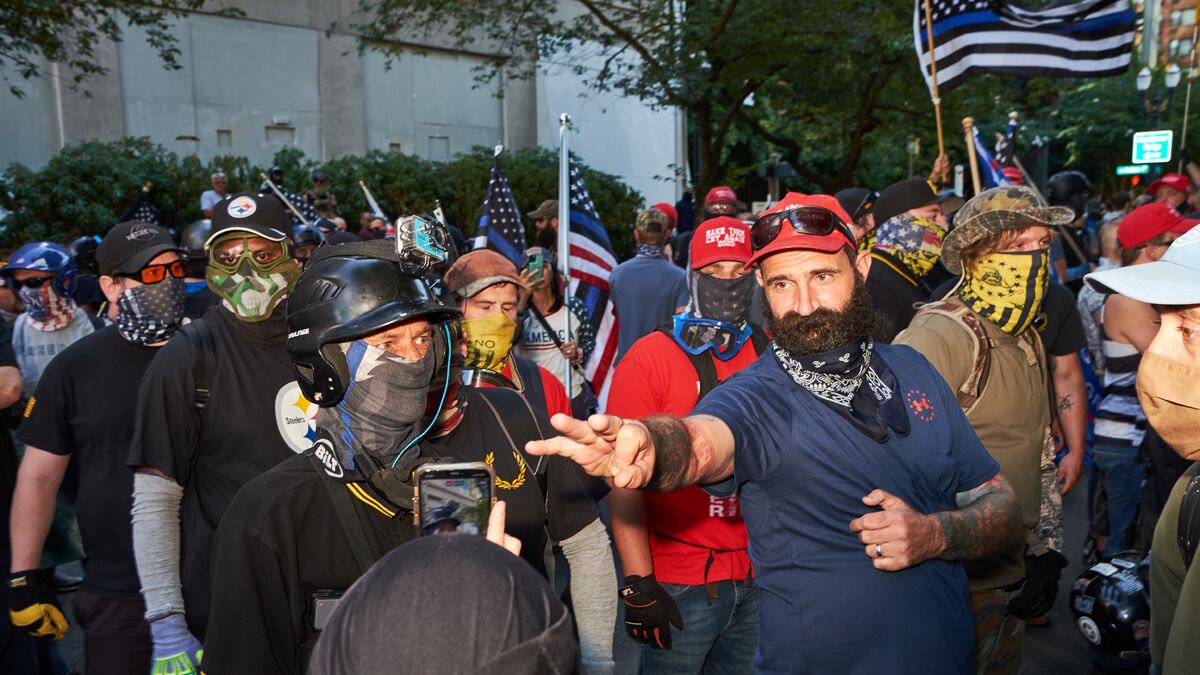Before Tusitala "Tiny" Toese arrived at the "No Marxism in America" rally Aug. 22, he was a wanted man. But that didn't stop him from attending the rally in broad daylight in downtown Portland and walking within feet of Portland police officers who had probable cause to arrest him.
What Toese did: On Aug. 11, Multnomah County Circuit Judge Kathleen Dailey issued a warrant for Toese's arrest after he violated conditions of his probation agreement stemming from a conviction for a 2018 assault. That agreement prohibits him from attending protests through 2022, and from leaving his home in Vancouver, Wash., except for work, medical appointments, and meetings with his probation officer. The agreement also requires him to wear a GPS tracking device.
On Saturday, Toese thumbed his nose at those restrictions and openly defied his probation agreement. Video showed him casually strolling by police.
What police did: Nearly 30 Portland officers stood by for the duration of the event. They did not attempt to apprehend Toese despite contacting the county's probation unit and notifying it of Toese's presence that afternoon, indicating police were probably aware Toese had an active arrest warrant while he was at the protest.
Their reason for inaction: The situation was already volatile and arresting Toese in the middle of it would only escalate it further, according to Multnomah County Department of Community Justice director Erika Preuitt, who had direct conversations with bureau staff regarding Toese's attendance. (Preuitt is unable to comment on specific tactics of the Portland Police Bureau.)
"I understand that there's a lot that they have to consider in such a volatile situation, and I respect the decisions that they have to make," Preuitt says. "We want Mr. Toese arrested and it is our expectation that he will be arrested."
A spokeswoman for the DCJ, which oversees the county's probation program, tells WW the Portland Police Bureau notified the department of Toese's presence by sending a "possible offender contact" notification while Toese was probably still there.
"Law enforcement (PPB) did send notice [to DCJ] on Saturday about Toese's presence at the protest," spokeswoman Jessica Morkert-Shibley says. "We received an electronic notification on Saturday (8/22) afternoon at 2:41 pm through a law enforcement notification system."
It remains unclear whether officers on the ground had knowledge of Toese's presence, but the bureau's command post did, according to PPB spokesman Derek Carmon.
At the time of the protest, Toese's GPS tracking bracelet, required by court order, was either not charged or not functioning because he had tampered with it, Preuitt says. She says DCJ hasn't been able to consistently track Toese's location for weeks.
Preuitt says DCJ extended Toese's warrant to Washington state—where he lives—so Washington law enforcement has legal authority to arrest him, too.
Why it matters: Critics say the Portland Police Bureau has arrested left-wing protesters for much less.
"Tiny didn't think anything would happen to him and he was right," says Juan Chavez, director of the Civil Rights Project at the Oregon Justice Resource Center. "They are playing favorites and it's hard not to see it any other way."
Ashlee Albies, a civil rights lawyer in Portland, says the decision not to arrest Toese is an example of viewpoint discrimination—that is, granting deference to one group because of their political views.
"They've been arresting protesters without any problem for the past 90 days," Albies says. "I think it shows that viewpoint discrimination is a thing."
Police Chief Chuck Lovell didn't address Toese's situation specifically during a press conference Tuesday, but says that arresting in a crowd can make a tense situation worse.
"What is it going to take for us to wade into a crowd of people to make an arrest on a warrant?" asks Lovell. "It's probably not something we'd look to do in that type of crowd control situation."
Multnomah County Circuit Judge Benjamin Souede issued a warrant for Toese's arrest June 24 after video surfaced of him joining in an assault of a protester in Seattle.
Toese turned himself in that same day and was placed on house arrest June 25. His probation officer wrote on Aug. 7 that Toese continued to violate his probation agreement and she asked a judge to issue a second warrant for his arrest. That warrant, issued Aug. 11, is still outstanding.
Since July 22, DCJ has been seeking to revoke Toese's probation and have him sentenced to one year in jail—the maximum he can serve for his violations, according to probation reports obtained by WW.
That probation agreement, which Toese has violated on multiple occasions, followed his January 2020 conviction for punching a man in the face, unprovoked, on a Northeast Portland sidewalk in the summer of 2018. WW's previous reporting led to Toese's arrest and conviction in that case.
"It seems like the First Amendment rights of some protesters are valued more highly than others'," Albies says. "It has such repercussions for our community and how the community feels safe and protected."
